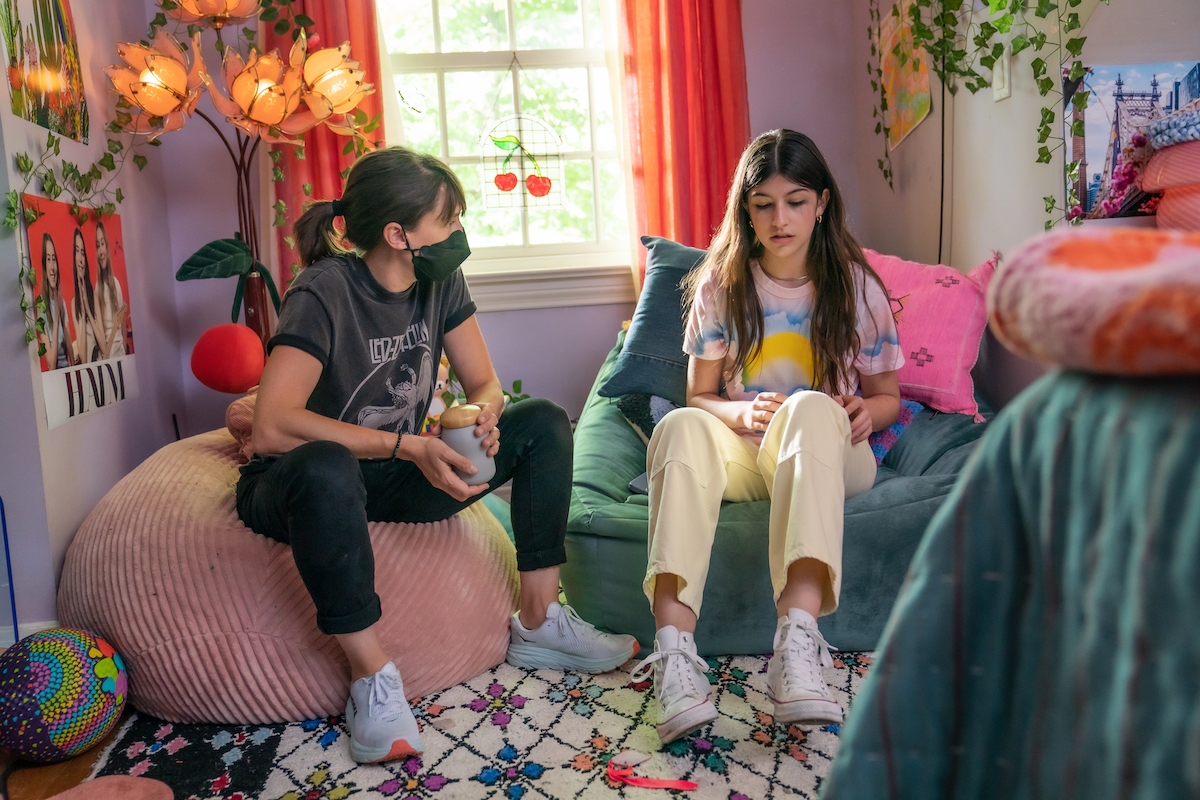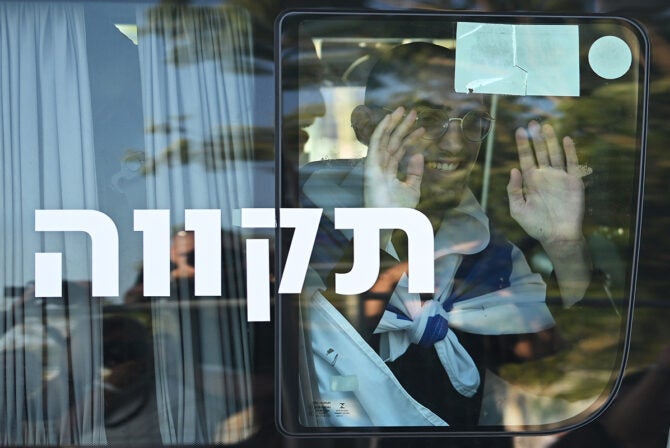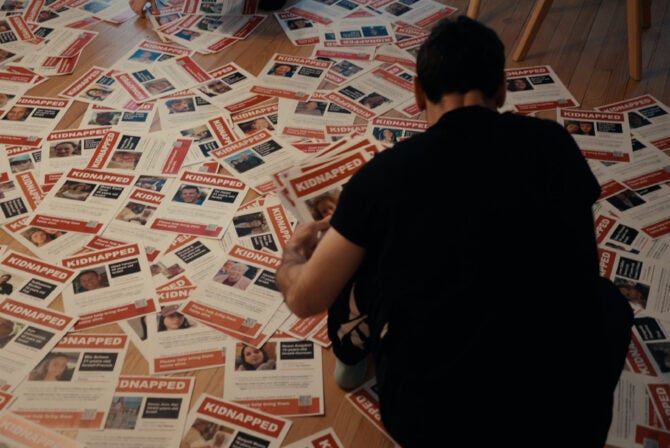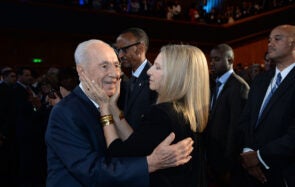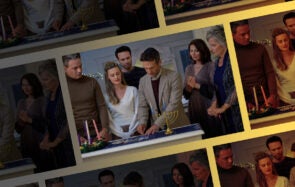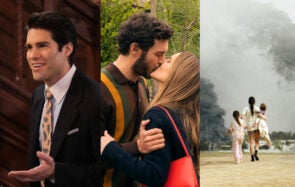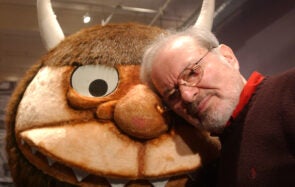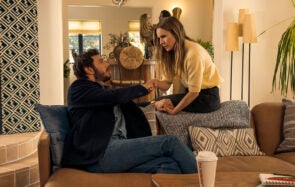Sammi Cohen was the perfect choice to direct “You Are So Not Invited to My Bat Mitzvah,” the Adam Sandler-produced Netflix movie about a chaotic Jewish coming-of-age. They not only directed Hulu’s queer high school romcom “Crush,” but they also care deeply about authenticity — and giving teens fun, entertaining and diverse representation.
The movie, which I’d argue is the best bat mitzvah movie ever made (the competition, to be fair, is not very stiff), feels like a pretty great portrayal of how vicious and petty and messy teens can be. It’s also, in very Jewish fashion, a tale of atonement, in which Sunny Sandler’s Stacy Freidman not only gets a lesson about what it really means to do a mitzvah — but about making up for the hurts you’ve caused and taking responsibility for your actions.
“You Are So Not Invited to My Bat Mitzvah” is also wonderfully Jewish — with Hebrew lines, a larger-than-life rabbi played by Sarah Sherman, a maybe too quirky Israeli DJ, a bunch of chutzpadik older Jewish ladies and, perhaps most delightfully, a beautiful nuclear Jewish family in the Friedmans, played by Adam Sandler, Idina Menzel and Sadie and Sunny Sandler.
Both deep and casual Jewishness is intrinsic to Cohen’s identity. In the middle of our conversation, they suddenly disappear from Zoom due to a power outage. When they come back, I tell them I was just about to ask about their dream b’nai mitzvah theme.
“Then panic ensued? How neurotic and Jewish of me!” they respond, before answering the question.
Kveller talked with Cohen about crashing Toronto bat mitzvahs, becoming part of the Sandler family, the importance of Jewish casting and more.
This interview has been edited and condensed for clarity.
If Adam Sandler asked me to direct a bat mitzvah movie, that would be the highlight of my career. I don’t think you can go higher than that. What was that like?
I mean, yeah, it’s a dream come true. It’s a little surreal, and it took a while to sink in. I grew up loving “Billy Madison” and loving [Sandler]. It has nothing to do with him being Jewish. He’s just an icon. So yeah, it’s all been very surreal and amazing. And maybe the highlight of my life. It’s all downhill from here.
You accomplished quite a feat!
And the truth is, I love him. I love the whole family. I got really close with the girls, too. I just wish I could keep making movies with them forever.
I love the relationship between the girls’ characters. “Nepo babies” and children of famous actors have a certain reputation — what was it like working with them? And what was it like having their parents be on set?
Nepotism aside, they’re both so good and so dedicated and want to do what they do. They’re just really passionate. We worked a ton, just me and them, in rehearsals beforehand, really digging into their characters. They worked so fucking hard, excuse my language. They’re really skilled, and they put in the time and effort.
I think they inherited a real love for filmmaking, which is clear when you work with Adam. He’s one of the most talented actors, but he’s just so gifted in the art of filmmaking, too.
As far as having their parents on set, it was a beautiful thing. The Sandlers not only made me a part of the family, but everyone had space to do their own thing — and then there was support when they needed it. You get this really natural chemistry when you work with the Sandlers that makes it all feel like slice of life. They’re really having fun, it’s just this beautiful bonus you get.
Right before this, I spent a lot of time getting to know the Sandlers and I went to Sunny’s actual bat mitzvah. It was this big coming-of-age moment for the family. And then that went right into filming the movie. So it felt like this continuation of Sunny’s coming of age. Sadie was turning 16 — that’s another big moment. And then, in real life, Adam and Jackie were watching their kids become adults. That we got to do that in the real world and in this movie world was so beautifully poetic.
The cast is obviously very Jewish. Did you talk about everyone’s bar and bat and b’nai mitzvahs?
We definitely wanted to have authentic Jewish representation when we could. [Besides the cast], a lot of the crew members and our department heads are Jewish and a lot of people had bat and bar mitzvahs. For example, our art department and set designer and I had a foundation — we know about bar/bat mitzvahs’ look, what the synagogue should feel like when you walk in.
I’m in my 30s now, and I’ve been to a ton of bat mitzvahs, but not any very recently outside of Sunny’s — so [while shooting in] Toronto, we went to a bunch of bat, bar and b’nai mitzvahs to see — does this all hold up? And OK, yeah, it does.
Like yes, the “Cha-Cha Slide” is still there…
There are certain things that have changed, like the b’nai mitzvah [as a gender neutral option], that’s new. But certain things are the same. There’s still swag. There’s still the “Cha-Cha Slide.” There’s still of course the hora and the traditional parts of it. There are new things, like now kids exclusively wear sneakers. I don’t know about you, but when I was a kid, no girls were wearing sneakers, right? We were forcing our feet into heels, which is in the movie for a second. But these kids are actually wearing Air Force 1s. And I was like, oh my God, this is so much smarter!
Did you have a b-mitzvah ceremony?
I hate to admit it… I went to Hebrew school… I studied… I was very… I was not who I am today. Part of it was a little bit gender, and I was very shy as a kid. I didn’t want to do the whole thing in front of everyone. So I got to have the party, which was amazing. But I didn’t officially become a bat mitzvah until I was on Birthright.
I still haven’t! I grew up in Israel so I just had a party at age 12. Did you have a theme for your party?
I had my mom dig up from the garage my big sign-in board, which I wish I had behind me right now, but no, I didn’t have a theme. I just had a big rager and that was that.
That sounds kind of great, was it a good experience?
Yeah, it was fun. It was with two other people. But then I went on Birthright and did that whole thing. That reconnected me to a lot of this stuff. I go to Shabbat and I’m Reform. It worked out.
If you had a mitzvah ceremony now, what would your theme be?
I think my theme would probably be movies, as clichéd as that sounds.
That’s a really solid theme.
Or dogs, because my other obsession is my dog.
As a Jewish mom, I love the way Jewish parents are represented in this movie. Both Idina and Adam are not the Jewish mom and dad stereotypes — they’re so sweet. It’s kind of the Dr. Jekyll of the Mr. Hyde’s “Uncut Gems.”
I keep joking that this is like the happy prelude to their marriage. But the Jekyll and Hyde is a perfect reference.
Adam is also known for being this kind of subversive, very foul-mouthed comedian. There’s still a little bit of that element in the movie, but there’s something so soft about him in here.
I think that’s what was really exciting. He still has his very goofy moments, and you still see the dad jokes that feel so authentic to Jewish parents — they just feel like our collective Jewish mom and dad. But I think what was really fun was to see Adam in this role that’s earnest and grounded and felt just very real. This sweet, goofy Jewish dad, who’s still struggling with having to let go of this younger version of his kid. That scene where he gets mad, and they have that confrontation in the bedroom — there’s some real tense moments, but it’s still so full of love.
And then there are moments of levity. One of my favorite scenes is in the car when he fake spills the coffee on her. That was a sweet little improvised moment not in the script. We found that in rehearsal, and I was like, that’s such a real thing my dad would do.
And then Sarah Sherman was so great as the rabbi — so fun, with all the walking in her office!
The treadmill! What’s funny is that when we were scouting our location, the rabbi — that was his actual treadmill. He had a walking treadmill under his desk, and we went, “This is too good!” It felt so right for her character. It allowed her to be Sarah Sherman, if that makes sense, but still within the world that we’re creating.
Yeah, it’s such a unique rabbi portrayal.
I grew up with a female rabbi, so in my mind, I was like, “Oh, we have to have a female rabbi.” And obviously, this is very much Reform and a really progressive look at Judaism. The Sandlers have a queer female rabbi and I was like, that’s really cool. It’s not representative of every version of the [Jewish] experience, but it was definitely important to me and I think it’s hopefully just going to normalize that for more people.
The movie portrays a very specific kind of Jewish experience. It’s a more wealthy, privileged American Jewish experience, which is not everyone’s. How did you navigate that?
Good question. I think it’s tricky. We were aware that this couldn’t be representative of every single Jewish kid’s experience. And there’s all walks of life and different socio-economic statuses. This is a middle-upper class, because obviously, these are kind of baffling parties. It was mostly a discussion of what made most sense to this world and the story. What Stacy’s going through— the idea of doing a mitzvah, and [figuring out] who you want to be in the world, what you want to give back, the ideals and what we all learn at its core — the hope was that, no matter what, that would come through. The other stuff would just be the dressing on the cake, but the heart of the movie would still resonate with everyone.
I really loved hearing the Hebrew and Stacy practicing her haftarah. What went into making sure that everything was Jewishly accurate?
We had some rabbis who were consultants. I know a little bit [of Hebrew], and Sunny was coming right off of studying for her bat mitzvah, so she speaks some Hebrew. But we really wanted to be careful and represent things authentically and check ourselves. So we had a lead rabbi that was consulting, and then a couple of other rabbis that we would send everything to. Even when you see [Stacy’s] notebook, and there’s a sheet of Hebrew, we sent that and we made sure everything she’s saying matches. We were just really, really careful with the details.
We’ve been talking a lot about authentic Jewish representation in movies and TV. The trailer for “Maestro” just came out to great controversy. What are your thoughts about that in a more broad sense? How important is authentic casting to you?
It’s important. It was a discussion for this movie. I’ll speak to this in a couple of ways. Right before this, I made a movie that was very queer. And that was a similar question I got. I think it’s important. I don’t think it’s necessary, exclusively. There are a lot of kids in “You Are So Not Invited;” we wanted to represent the sort of diverse Jewish population that we’re seeing in real life. And so you see that on-screen. Finding a Jewish kid to play every single one of those parts… I think we have about 80% [Jewish actors].
That said, I think for our protagonist, for our family — I think it’s important, and I think it does make a difference. A part of it is just the way we speak and carry ourselves. I think there’s something to be said about casting authentically, when it’s so tied to the story and who these people are, but it’s a controversial topic. Some people go, “No, what’s best for the movie?” And I agree, but I think those two things go hand in hand and work together.
Do you have a favorite Adam Sandler movie?
I think my favorite is “Billy Madison.” That’s because I grew up watching that movie. “Happy Gilmore,” “Billy Madison” — I love those movies. As an adult. “Punch-Drunk Love” is one of my favorites.
The actors obviously can’t promote the movie right now because they’re on strike with SAG-AFTRA. Is there anything you want to say in solidarity or on behalf of the cast?
Look, I’m disappointed that we can’t all be talking about this film, because we all love it so much, and this was such a special experience from beginning to end. I’m happy to talk about it on behalf of everyone but, as a director, I am nothing without my actors. I am nothing without my writers. I am nothing without the hundreds of people who came together to make this movie. And so I’m excited for writers, actors and hopefully our below-the-line crew — for everyone to get what they deserve. Because I’m nothing without them. I wouldn’t be here without them. We’re excited for the movie to be out and for these deals to be done in a way that gives them what they deserve.
What’s next for you?
Well, it’s weird timing. Everything got put on pause. I’m just looking to tell more stories that are Jewish and/or queer. Another movie is coming, I just can’t talk about it yet.
